Benjamin Pyne
Benjamin Pyne, apprenticed to George Bowers 1667, free 1676. The maker’s mark “single letter P under a crown”, found shortly after 1680, appears on the 1697 copper plate at the Goldsmith’s Hall, and reappears after 1720, again unentered, can safely be attributed to him. His only authenticated marks are two entered as a largeworker, undated, probably entered in 1697 on commencement of register. He held the position of Subordinate Goldsmith to the King for the coronation of George I only. His son Benjamin was apprenticed to him 21 October 1708, free 8 May 1716 and was elected Assistant Assayer in 1720. By the end of the seventeenth century Pyne was obviously, from his surviving work, a front ranking London goldsmith and shared with Anthony Nelme the main responsibility of upholding native standards against Huguenot competition, even though it’s more than likely that he and Nelme employed (or bought up and remarked the work of) the latter to some extent.
Pyne’s connection with Hoare’s bank seems to have continued for a considerable period and is perhaps responsible for the quantity of orders for municipal maces, regalia and church plate he obtained. However the end of his life was sad. On 17 January 1727, when he must have nearly been 75, he resigned from the Livery, probably due to ill health and bad eyesight, and petitioned with others for the place of Beadle to the Company, vacant by the death of John Bodington, and was elected the same day to the post.
Benjamin Pyne
Benjamin Pyne, apprenticed to George Bowers 1667, free 1676. The maker’s mark “single letter P under a crown”, found shortly after 1680, appears on the 1697 copper plate at the Goldsmith’s Hall, and reappears after 1720, again unentered, can safely be attributed to him. His only authenticated marks are two entered as a largeworker, undated, probably entered in 1697 on commencement of register. He held the position of Subordinate Goldsmith to the King for the coronation of George I only. His son Benjamin was apprenticed to him 21 October 1708, free 8 May 1716 and was elected Assistant Assayer in 1720. By the end of the seventeenth century Pyne was obviously, from his surviving work, a front ranking London goldsmith and shared with Anthony Nelme the main responsibility of upholding native standards against Huguenot competition, even though it’s more than likely that he and Nelme employed (or bought up and remarked the work of) the latter to some extent.
Pyne’s connection with Hoare’s bank seems to have continued for a considerable period and is perhaps responsible for the quantity of orders for municipal maces, regalia and church plate he obtained. However the end of his life was sad. On 17 January 1727, when he must have nearly been 75, he resigned from the Livery, probably due to ill health and bad eyesight, and petitioned with others for the place of Beadle to the Company, vacant by the death of John Bodington, and was elected the same day to the post.
-

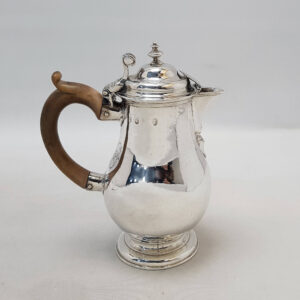
1707
Benjamin Pyne
10294 Queen Anne Antique Silver Milk Jug
£4,750
A rare little antique covered milk jug having a hinged lid and spout with hinged cover. Britannia standard silver*. This is one of the earliest forms of milk jug and the style is very much like a contemporary coffee pot. Simple plain design and very pretty wooden handle. Hand engraved below the spout with a lion crest and duke’s coronet, and between the handle sockets with an earl’s coronet above a cypher. Contains 400 ml.
Weight 448 grams, 14.4 troy oz. Height 17.2cm. Spread 14cm. London 1707. Benjamin Pyne -

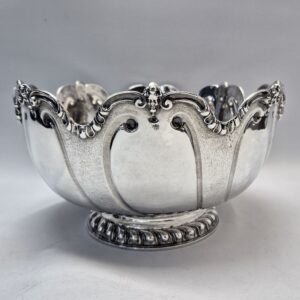
1689
Benjamin Pyne
10427 William and Mary Antique Silver Monteith Bowl
£8,950
An attractive early English silver punch bowl from the late 1600’s having a castellated top with cherub heads; the circular foot with a bold gadrooned border. Good gauge silver. The body decoration, typical for a monteith of the late 17th century, has a series of asymmetrical lobed panels intersected by spiral flutes of matted background which closely resemble cornucopia. Weight 1100g, 35.3 troy oz. Diameter 28.8cm. London 1689. Maker Benjamin Pyne, a well known maker of the period. Sterling silver.
-

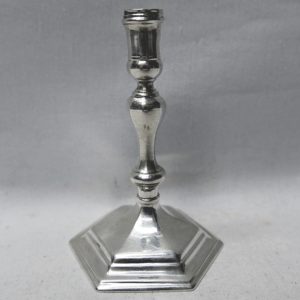
1722
Benjamin Pyne
8763 Antique George I Silver Taperstick
Sold
A delightful little antique silver taper stick of plain early design with baluster stem and raised hectagonal foot. Cast silver. Weight 112 grams, 3.6 troy ounces. Height 11 cms. Base diameter 6.8 cms. London 1722. Maker Benjamin Pyne.
-

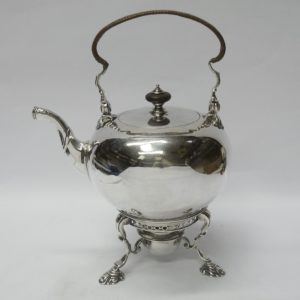
1729
Benjamin Pyne
9041 George II Silver Tea Kettle
Sold
An excellent antique sterling silver samovar of plain design and having a shaped folding handle with raffia finish. Uninscribed. The matching stand has a cut-work frieze and stands on large shell feet, it has a removable burner well with push on top. Contains 1550 ml. Weight 1589 grams, 51 troy ounces. Total height 30 cms (handle extended)/ 22.5 cms (to top of kettle finial). London 1729. Maker Benjamin Pyne.
-

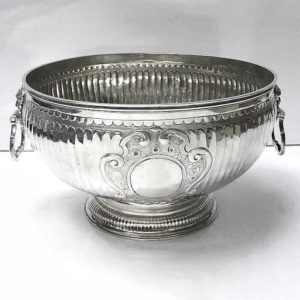
1705
Benjamin Pyne
6197 Queen Anne Silver Bowl
Sold
A rare and important early English silver bowl from the Queen Anne period. Large size with charmingly quaint lions mask side handles and the ribbed body decoration typical for this period. There is a large scroll cartouche to the front with deep chased decoration. Britannia standard silver*. Weight 1315 grams, 42.2 troy ounces. Height 16.5 cms. Diameter 27.5 cms. London 1705. Maker Benjamin Pyne.
-

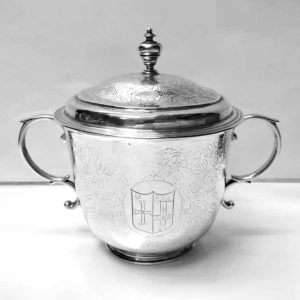
1688
Benjamin Pyne
6976 James II Antique Silver Porringer and Cover by Benjamin Pyne
Sold
A rare early English sterling silver porringer with matching lid having engraved decoration of cherubs, birds, flowers etc. This chinoiserie decoration was popular over about a ten year period – it is rarely found and adds considerably to the piece. Excellent colour. This charming piece has an armorial to the front and a crest to the reverse. This porringer was sold in 1961 by the famous silver expert Mrs G.E.P How of Pickering Place, St James, London and she describes it in the accompanying paperwork (see photos) as being “of a most unusual form” .I know of only three other examples of this work”. Weight 422 grams, 13.5 troy ounces. Height 9.5 cms, 15 cms with cover. Spread 18 cms. Diameter 11.5 cms. London 1688. Maker Benjamin Pyne.
-

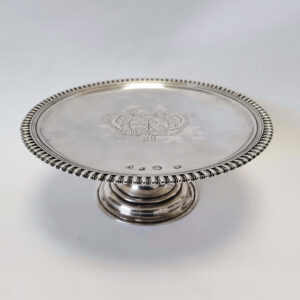
1692
Benjamin Pyne
10365 William and Mary Antique Silver Tazza
Sold
A fine quality antique silver footed salver with a gadroon edge and cut card applied work to the underside. A rare feature is the screw action detachable foot. Heavy gauge silver. Hand engraved to the top is a marital coat of arms for Raymond and Jemmett. Weight 575g, 18.4 troy oz. Diameter 19cm. Height 7.5cm. London 1692. Maker Benjamin Pyne. Sterling silver.